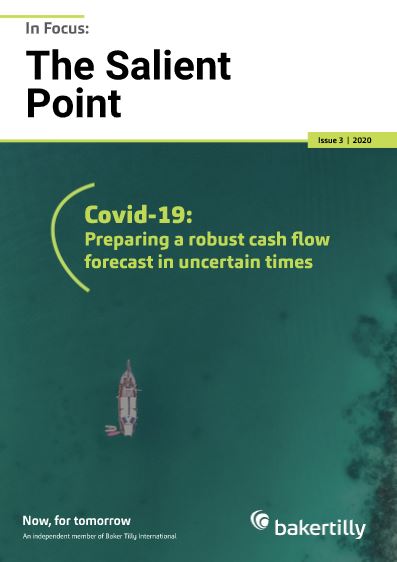Suggested Reading:

In our previous Salient Point (Issue 3), we discussed how a company could go about preparing a cash flow forecast. Such a forecast, as mentioned in that article, could be helpful to improve the company’s cash flow visibility under uncertain times. Additionally, cash flow forecast could be used to determine the value of the business using the discounted cash flow (“DCF”) method. Such a valuation could be used for, amongst other things, fund-raising, impairment assessment and/or reporting to stakeholders.

In valuing the equity of a business, it is common to first estimate the value of the business as a whole. This value is referred to as the enterprise value (“EV”). EV reflects the value of all of a business’ funding sources i.e. all forms of the business’ debt and equity.
Covid-19: Preparing a robust cash flow forecast in uncertain times
By: Adrian Cheow, Executive Director & Practice Leader, Deal Advisory, FCCA ![]()
Introduction
Businesses currently find themselves in unchartered waters as the Covid-19 pandemic situation continues to persist. Even historically profitable businesses are not spared as supply chains globally are disrupted and the future looks bleak. In particular, small and medium enterprises (“SMEs”) have been hit hard. The SBF-Experian SME Index1, which tracks business sentiment specifically for SMEs in Singapore for the next six months, fell from 50.4 in Jan 2020 to 48.3 in April 2020, reaching an all-time low since the establishment of the index in 20092.
To navigate uncertain times, it is crucial for SMEs to review their existing business plans and cash flow forecasts which may be obsolete given the disruption caused by Covid-19.
A review exercise can go a long way in helping SMEs to:
1. Ensure sufficient cash is available to sustain business operations in the near to medium term;
2. Improve visibility of the future cashflow issues to support management with foresight to take mitigating steps in a timely manner; and
3. Estimate their business value which will be useful, for fund raising, impairment assessment and/or reporting to stakeholders.
One valuation approach is the discounted cash flow (“DCF”) method. This method estimates the present value of a business by discounting future cash flows at a risk adjusted discount rate. In this article, we aim to provide a list of points to consider by which a company could conduct a review of business plan and prepare cash flow
forecasts under the current uncertain circumstances. In a subsequent article, we will discuss aspects of the discount rate that would need to be considered.
Reviewing a company's business plan
In uncertain times, a business plan can be prepared on two fronts:
1. Managing the challenges in the short-to-medium term; and
2. Establishing strategic direction for the company in the medium-to-long term to capture the opportunities that may emerge once the Covid-19 pandemic comes under control.
The table below sets out key considerations for businesses in the short-to-long term.

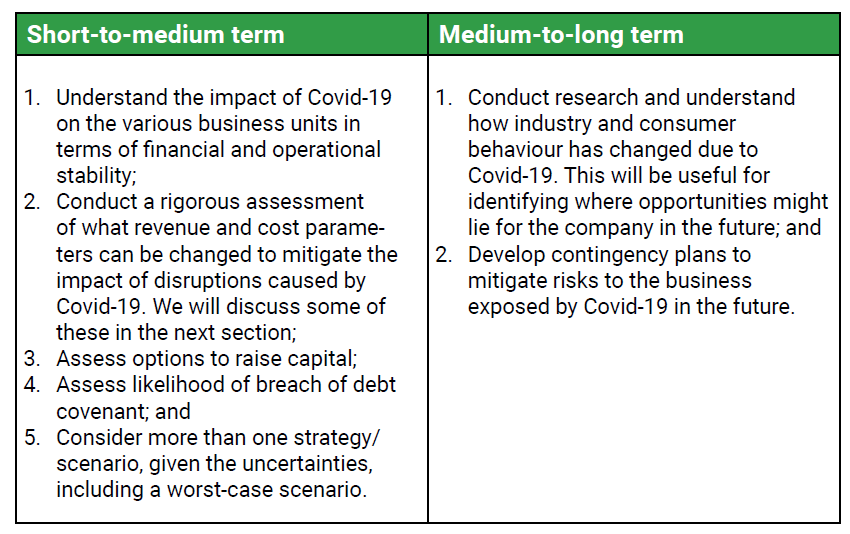
Preparing a robust cash flow forecast
Frequency of financial forecast

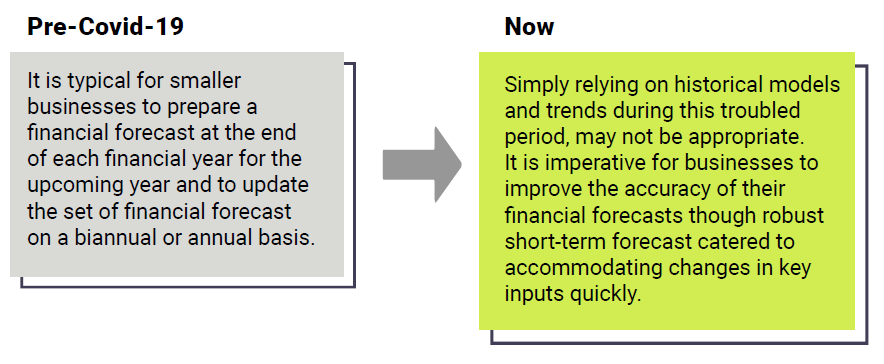
Forecasting operating revenues

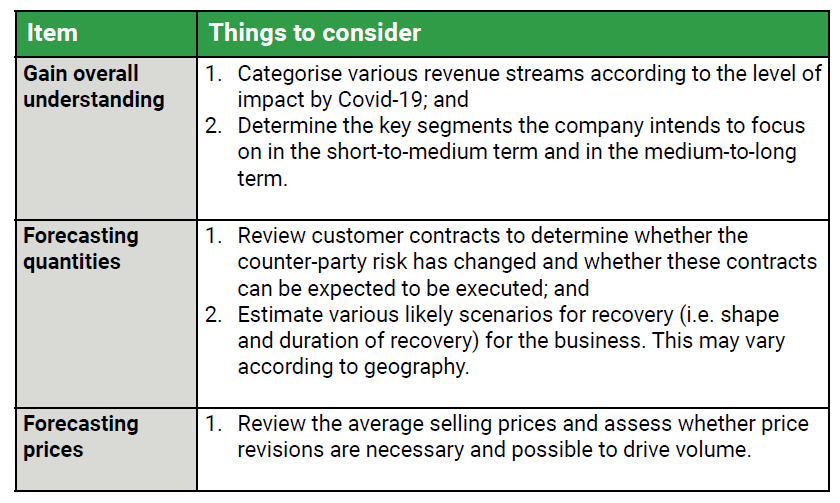
Forecasting operating expenses
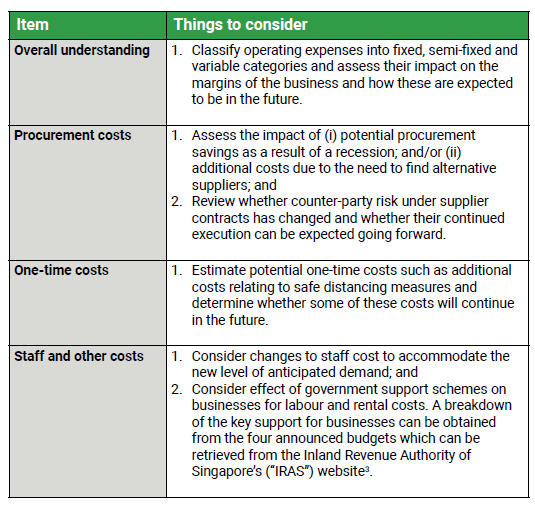
Forecasting taxes
As with the government support schemes to support business costs, review and consider the government policies on any proposed tax measures to support businesses4.
Forecasting capital expenditure

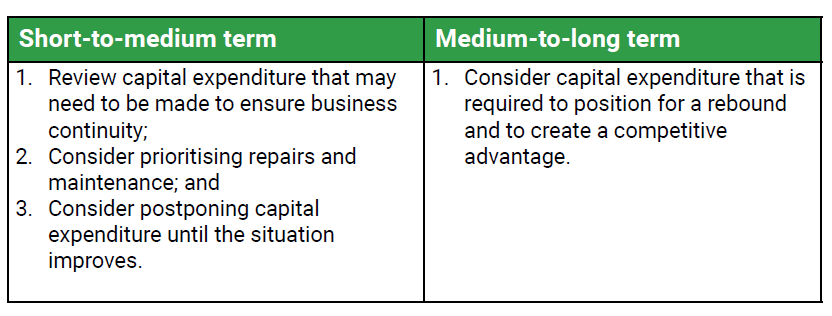
Forecasting working capital

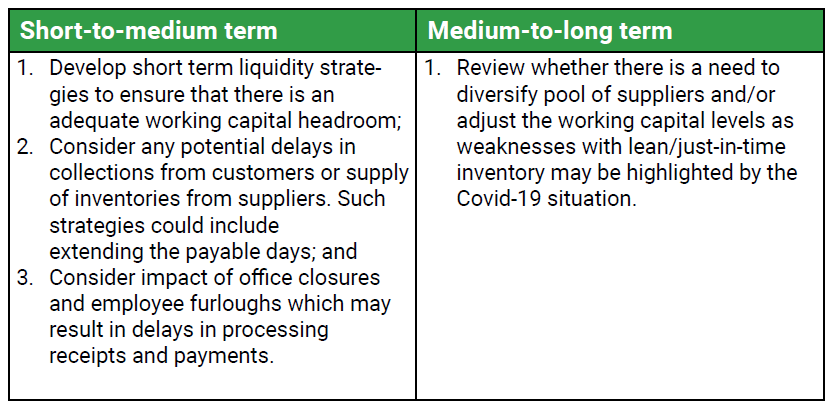
Forecasting financing inflows and repayments
1. Assess availability of lines of credits and other financing alternatives (e.g. government backed loans such as Enterprise Financing Scheme – SME Working Capital Loan and Temporary Bridging Loan Programme in Singapore);
and
2. Assess ability to renegotiate principal, interest maturities, repayment or other loan agreement terms such as borrowing base, collateral and/or leverage, debt covenants or trigger points.
Concluding thoughts
During these uncertain times, it would be appropriate to prepare probability weighted expected cash flows. This would involve:
1. Preparing cash flows under various scenarios;
2. Assigning realistic probabilities to each of these scenarios; and
3. Calculating the probability weighted expected cash flows by multiplying the cashflow with their respective probabilities.
Such an exercise can be conducted within scenarios too – i.e. a base-case scenario cash flow forecast could be prepared on a probability weighted expected cash flow basis. Scenario testing would allow management and owners to be pro-active by understanding which scenario their business could be in and how they can manage their cash flow needs in their worst-case scenario. The cash flow forecasts should also be revisited and adjusted
on a weekly or monthly business to reflect new information available.
How we can help
Covid-19 looks set to be a turning point to define the 21st century as we know it. This is an opportune time to revisit your business plans, develop new cash management habits and brainstorm the best way forward so as to come out of this storm stronger than ever. Our Deals Advisory team can provide expert guidance on preparation of cash flow forecasts based on detailed forecast financial information as well as support in the form of financial modelling and/or valuation. We can also help identify ways to stabilise your business during this difficult period and present viable options to help your business adapt and grow.
1 An index created by the Singapore Business Federation (“SBF”) and information services company Experian.
2 https://www.straitstimes.com/business/economy/sme-business-sentiment-sinks-to-all-time-low-on-coronavirus-uncertainties-survey
3 https://www.iras.gov.sg/irashome/News-and-Events/Singapore-Budget/Resilience-Budget-and-Solidarity-Budget---Support-Measures-for-Taxpayers/
4 https://www.iras.gov.sg/irashome/News-and-Events/Singapore-Budget/Budget-2020---Overview-of-Tax-Changes/
Get in touch with the author(s):


Adrian Cheow
Executive Director & Practice Leader
Deal Advisory![]() | Email
| Email
Download The Salient Point - Covid-19: Preparing a robust cash flow forecast in uncertain times:
>> Back to The Salient Point>> Main Page
DISCLAIMER: All opinions, conclusions, or recommendations in this article are reasonably held by Baker Tilly at the time of compilation but are subject to change without notice to you. Whilst every effort has been made to ensure the accuracy of the contents in this article, the information in this article is not designed to address any particular circumstance, individual or entity. Users should not act upon it without seeking professional advice relevant to the particular situation. We will not accept liability for any loss or damage suffered by any person directly or indirectly through reliance upon the information contained in this article.


